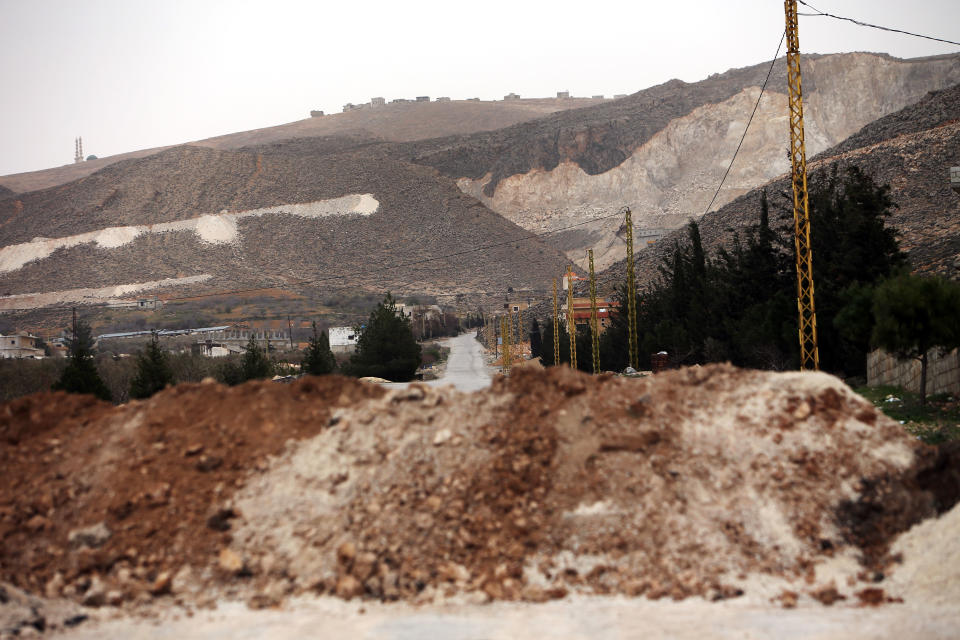In Syrian spillover, hostilities swell in Lebanon
BEIRUT (AP) — Gunmen from Lebanon's militant Hezbollah group and local Shiite Muslim residents tightened their blockade of a Sunni town near the Syrian border Tuesday, sparking concerns that thousands of Syrian refugees stranded in the area could be cut off from humanitarian aid.
The standoff outside of Arsal, a Sunni border town in eastern Lebanon that has long been a haven for Syrian rebels, has further stoked sectarian tensions in Lebanon, where Sunnis and Shiites support opposing sides in the Syrian conflict.
There has been a further influx of Syrian rebels and refugees into Arsal since Sunday, when President Bashar Assad's troops and his Lebanese Shiite Hezbollah allies captured the opposition stronghold of Yabroud just across the border.
Over the weekend, gunmen closed off Arsal's only road to the rest of Lebanon by erecting a sandbagged checkpoint manned by heavily armed Hezbollah gunmen and Shiites from a string of surrounding towns. The move came after the area's Shiites blamed Arsal for rocket fire toward their villages in recent days and a car bombing that killed three people.
On Tuesday, Shiite gunmen opened fire at vehicles from Arsal that tried to drive up toward the checkpoint, said the town's deputy mayor, Ahmad Fliti. The shooting heightened despair within Arsal, now home to 40,000 Lebanese and 52,000 Syrian refugees for whom the road is a vital lifeline.
Another 200 Syrian families have arrived in Arsal over the past few days, fleeing fighting as Syrian troops seized Yabroud, said Lisa Abu Khaled of the U.N.'s refugee agency.
"Everybody needs help. They need blankets and food. But we are currently facing a ticking bomb of contagious illnesses, a ticking bomb of hunger and a ticking bomb of people," said Fliti.
Lebanese aid organizations distributed a three-day emergency food supply to the neediest refugees on Monday, said the U.N.'s Abu Khaled said. But she stressed that tens of thousands more were left to rely on dwindling stocks within the town.
"Assistance will definitely be hindered without the reopening of the road. What is available in Arsal won't be enough," she said.
Lebanon has been rattled by a series of deadly car bombings that have largely targeted Shiite areas of Beirut, and missiles and rockets frequently hit border areas.
But there were signs in the wake of Yabroud that anger among Lebanese Sunnis, many of whom resent Hezbollah's dominance of local politics, is spiking, and the conflict could be seeping to other parts of Lebanon.
On Tuesday, Sunni protesters closed some roads around Lebanon Tuesday with burning tires and other barriers to protest the blockade on Arsal.
The roads closed included the highway linking Beirut with predominantly Shiite south Lebanon, the highway linking the Lebanese capital with Damascus.
An AP reporter saw around 200 protesters blocking a major roadway between Beirut and the capital's southern suburbs. In an ominous sign, the demonstrators moved among the stopped cars and warned drivers with Shiite emblems on their vehicles that Sunnis would protect their brethren in Arsal. There was no violence, and all of the cars eventually moved on unharmed.
Demonstrators also closed the main route from town of Saadnayel in the eastern Bekaa Valley to the Baalbek region, a Hezbollah stronghold, as well as the northern coastal highway leading to the Syrian coast, according security officials.
Lebanese troops were working to open the roads.
In central Lebanon, meanwhile, a Syrian laborer was found stabbed near a construction site, Lebanon's state-run news agency reported. The man's blood was used to write the words "Revenge for Yabroud, and for Syria's honor," the agency said.
Across the border in Yabroud, the Syrian government took a small group of journalists, including an AP reporter, on a tour of the recently captured town.
Damage from the fighting was evident everywhere. Electricity wires were strewn across the road into town, windows were blown out and shop doors destroyed.
A field commander told reporters that some rebels fled across the border to Arsal, while others retreated to the Syrian towns of Rankous, Fallittah and Ras al-Ein. The commander, who spoke on condition of anonymity in line with regulations, said the army was now focusing on Ras al-Ein, and the heavy thud of government shelling there reverberated during the tour of Yabroud.
In Damascus, Prime Minister Wael al-Halqi estimated the cost of the Syrian war, now in its fourth year, had amounted to $30.1 billion, or 4.7 trillion Syrian pounds. In an interview to the pro-government al-Baath newspaper, al-Halqi gave no further details on how the amount was calculated,
Also Tuesday, rebels fired mortars at the capital Damascus, killing five civilians, the Syrian state-run news agency SANA said.
___
Associated Press writer Albert Aji in Damascus, Syria, and Ryan Lucas and Hussein Mala in Beirut contributed to this report.


